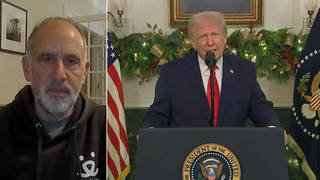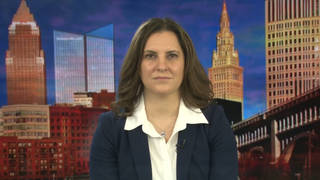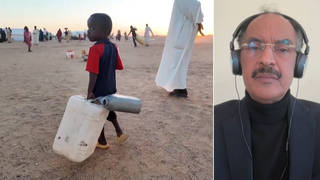
Topics
Guests
- Jane Franklinan author and historian of Cuba. Her books include Cuba and the United States: A Chronological History and Cuban Foreign Relations: A Chronology, 1959-1982.
The U.S. has formally removed Cuba from its list of state sponsors of terrorism, clearing a main obstacle to restoring diplomatic ties with Havana for the first time in over five decades. Cuba was placed on the terrorism list in 1982 at a time when Havana was supporting liberation struggles in Africa and Latin America. While Cuba is now off the terrorism list, most of the U.S. sanctions remain in place. We speak to historian Jane Franklin, author of “Cuba and the United States: A Chronological History.”
Transcript
AMY GOODMAN: We turn to Cuba. The U.S. has formally removed Cuba from its list of state sponsors of terrorism, clearing a main obstacle to restoring diplomatic ties with Havana for the first time in over five decades. Cuba was placed on the terrorism list in 1982 at a time when Havana was supporting liberation struggles in Africa and Latin America. State Department spokesperson Jeff Rathke made the announcement on Friday.
JEFF RATHKE: We’ve issued this morning a statement about the rescission of Cuba’s designation as a state sponsor of terrorism. It takes—it is effective today, May 29th, 2015. And this reflects our assessment after undertaking the review that was requested by the president, our assessment that Cuba meets the statutory criteria for rescission.
AMY GOODMAN: Former Cuban diplomat Carlos Alzugaray praised the Obama administration’s decision.
CARLOS ALZUGARAY TRETO: In the first place, we shouldn’t have been on that list ever, because Cuba has never supported terrorist activities. As President Raúl Castro has said, it is Cuba who has been the victim of terrorist activities. What does it mean? It means that Cuba can operate more safely now, that our citizens are not going to be subject to harassment because they come from a terrorist country, that our companies will be able to operate normally with banks. So, there are a number of benefits. And a very important benefit has to do with the internal workings of the United States system.
AMY GOODMAN: While Cuba is now off the terrorism list, most of the U.S. sanctions remain in place. Today we’ll spend the rest of the hour looking at the changing U.S.-Cuban relations. Joining us here in New York is Jane Franklin, author and historian of Cuba. Her book, Cuba and the United States: A Chronological History, is now available in Spanish. She’s also the author of Cuban Foreign Relations: A Chronology, 1959-1982. Franklin just gave a talk at the Left Forum called “Cuba’s Long Resistance to Miseries in the Name of Freedom.” Her writings on Cuba are available at JaneFranklin.info.
The significance of the U.S. taking Cuba off the list of state sponsors of terrorism, Jane?
JANE FRANKLIN: It is one of the major obstacles—or was—to normalization of relations with Cuba. When President Obama and President Castro announced the attempt to improve relations and move toward normalization, this was one of the main obstacles, along with the embargo, the trade embargo, and the base at Guantánamo still occupied by U.S. armed forces. And so, this is a major reduction of the obstacle. There are plenty left, though.
AMY GOODMAN: What does it mean, exactly? What now can Cuba do, now that it’s off the list?
JANE FRANKLIN: For one thing, it cannot be called a terrorist nation, which has a lot to do with relations with other countries, especially in Europe, and also with its relations with banks. Banks don’t want to invest in a country that’s called a terrorist country, because the United States fines banks for trading with Cuba if there’s a sanction against that. And now there isn’t, because Cuba is not on the list of terrorist nations.
AMY GOODMAN: In April, Republican presidential candidate Senator Marco Rubio of Florida blasted the Obama administration’s plan to remove Cuba from the list of state sponsors of terror.
SEN. MARCO RUBIO: Well, the decision made by the White House today is a terrible one, but not surprising, unfortunately. Cuba is a state sponsor of terrorism. They harbor fugitives of American justice, including someone who killed a police officer in New Jersey over 30 years ago. It’s also the country that’s helping North Korea evade weapons sanctions by the United Nations. They should have remained on the list of state sponsors of terrorism. And I think it sends a chilling message to our enemies abroad that this White House is no longer seriously—serious about calling terrorism by its proper name.
AMY GOODMAN: That was Senator Marco Rubio, “sends a chilling message to our enemies abroad.” Jane Franklin?
JANE FRANKLIN: Well, Marco Rubio’s parents left Cuba when Batista was the dictator of Cuba. So, they knew what a repressive government was like. Marco Rubio has not been to Cuba under this new government, the revolutionary government. If he went there and experienced it—
AMY GOODMAN: Meaning he hasn’t been there at all?
JANE FRANKLIN: No, no. He was born in this country after his parents left Cuba, before the revolution. So, he needs to go there and experience Cuba as it is now.
AMY GOODMAN: Can you talk about what—why this happened now?
JANE FRANKLIN: That is a very interesting question, Amy. A paradigm shift happened in 2009 when the Organization of American States voted to renew Cuba’s membership or presence in the Organization of American States. It had been suspended in 1962. President Obama made it clear he would not attend an OAS summit in 2012 if Cuba was in attendance. Meanwhile—and this is the paradigm shift—Cuba and other nations were joining together in the Latin American and Caribbean Community of Nations, CELAC, which was formed officially in 2011 in Venezuela, when President Hugo Chávez was the initiator of this fabulous organization, which contains all nations of the Western Hemisphere except for the United States and Canada. So, that switched from being an OAS, which had all the nations, with Cuba suspended, to an organization that excludes the United States. This was in 2011.
In 2012 at the summit, the countries in OAS voted again that Cuba be present at the OAS summit in 2015. President Obama and the head of the Canadian government voted against that, so there was no final statement. Obama was faced with two choices: He could isolate himself even further by not attending if President Raúl Castro attended, or he could be a statesman. He decided to try to be a statesman. And he began the secret negotiations the next year, 2013, that led to the announcements last December. So, when the announcements were made last December, the setup was for the 2015 summit. He wanted to be able to greet President Raúl Castro as a statesman. And he did do that, except for one major flub, which was, in March, he declared that Venezuela was a threat to the national security of the United States, which was such an absurd statement that he had to retract it very soon. And he ended up at the summit with Raúl Castro. So, I think it happened now because Latin America and the Caribbean states forced his hand.
AMY GOODMAN: What does this mean now, as Cuba opens up to the United States?
JANE FRANKLIN: It’s a wonderful step forward, because everything is on the table now. Josefina Vidal, who heads the delegation in these negotiations for Cuba, makes it very clear that they can talk about anything and negotiate anything. They are open to changing things. They are open to all kinds of discussion, maybe even some concessions, except for one major policy: They want to retain their independence and sovereignty. That is what they are determined to do and are doing in these negotiations.












Media Options